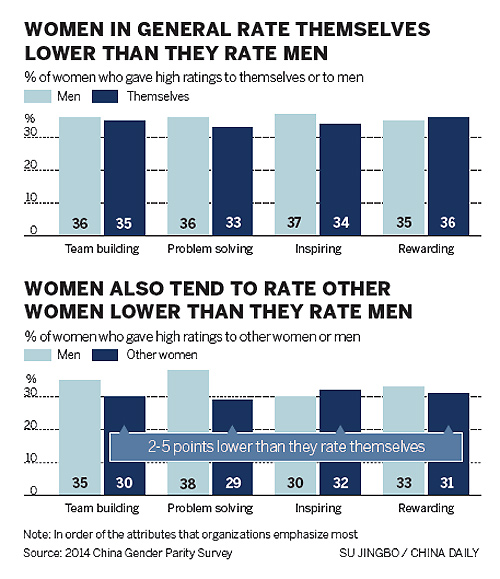Women still outnumbered in top jobs
China Daily, November 28, 2014 Adjust font size:

Despite China having one of the highest rates of female employment in the world, only a small percentage of women work in senior positions, said a research report released in Shanghai on Thursday.
Women hold less than 10 percent of executive level jobs in China and have only a 1 in 15 chance of reaching the chief executive suite, the report based on a study by Bain & Co said.
Only about 6 percent of CEOs and 8 percent of board directors are women, and only 27 percent of senior managers are female, according to the report.
The study in May surveyed 850 women who hold a variety of positions in more than 25 industries and 50 cities across China.
Disruption from family commitments is the top obstacle to women advancing in China.
"I wish to excel in my career and take good care of my family at the same time. Sometimes I feel that I might have been expecting too much," said Meng Xiaoqing, a 25-year-old clerk who has been working for three years for a furniture maker in Shanghai.
Meng said she once aspired to become head of her department, but she dropped the plan because she "might not be able to handle more responsibilities and a household at the same time".
China has introduced a series of gender parity policies and has promoted equal opportunities for women, but accepted norms and behaviors are somehow disconnected from these policies, said Jennifer Zeng, co-author of the study.
About 73 percent of working-age women in China are employed, compared with 67 percent in the UK, 66 percent in Australia and 62 percent in the United States.
Women tend to be as qualified as men when they enter the workforce, comprising 47 percent of university graduates in China, and they initially progress in equal numbers, holding 46 percent of professional positions, the report said.
"My observation is that enterprises have been investing heavily in improving gender parity, and female employees are better informed than ever about how to protect themselves when gender discrimination occurs," said Liu Wei, a lawyer at Shanghai Shenda Law Firm.
The real challenge is for companies themselves to counter the prevailing stereotypes, differences in women's and men's leadership styles, as well as gender and organizational biases, Zeng said.
Neither men nor women seem to like female bosses, who are perceived as being detail-oriented to the point of micromanaging. As women move up in seniority, they are also more likely to be labeled "aggressive" and "less feminine", and such stereotypes and labels can undercut women's confidence levels and make it more difficult for them to work effectively with others.
Du Xun, a senior manager of the accounting department of a financial services provider in Shanghai and a mother of two children, said women should not hold themselves back in fear of obstacles.
"It's much easier to withdraw with an excuse than tackling obstacles with determination, such as leveraging more resources or seeking help from family. It requires support from your spouse and employer, but the most important part is to throw away the unfounded lack of confidence," Du said.